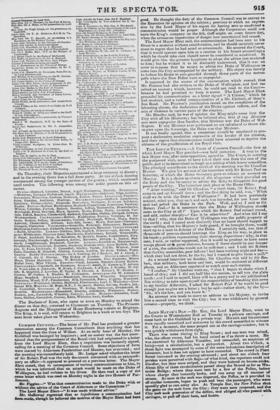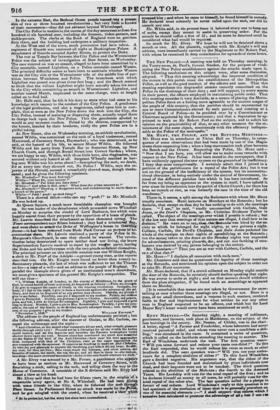LORD MAYOR'S DAY.—Mr. Key, the Lord Mayor Elect, went to
the Courts at Westminster Hall on Tuesday in a private carriage, and came back to the Guildhall by a private way. His exit and his entrance were equally unnoticed and unknown by the crowd assembled to witness it. For a moment, the mace peeped out at the carriage-window, but it was quickly withdrawn from sight. There was some rioting in King Street ; and one man was seized, who, the officer swore, had his hand raised as if to throw a stone. He was examined by Alderman Venables, and remanded, on suspicion of being--not a revolutionist, but a pickpocket. About two o'clock, a sham. fight was attempted by some of the same industrious description of labourers, but it does not appear to have succeeded. The crowd in Fleet Street increased as the evening advanced; and about ten o'clock four perstms were perceived with flags—of what kind, the reporters could not discover, but they were striped, and they were hoisted on broom-sticks. About fifty of these revolutionists passed along the Strand as far as Wa.. terlo'o Bridge; where they were met by a few of the Police, before whose charge they instantly broke, and ran away up all manner of streets. As soon as the mob was dispersed, the Police, as is provided in all similar instances, began to push and beat the passengers, who were speedily glad to run away also. At Temple Bar, the New Police shut the gates on the mob from the City: they were soon reopened, and the City mob took possession of the defiles, and obliged all who passed with carriages, to pull off their hats, and huzza. In the extreme East, the Bethnal Green people' torned-;-aill. a Proc$10,-.' eion of two or three hundred revolutionists ; but very little is known
of their movements—they did not advance beyond Whitechapel. .
The City Police in motion inthe course of the day amounted:to from five hundred to six hundred men, including the firemen, ticket-porters, and tickle-porters. The clerks at the Bank of England were on garrison duty there, and the building had undergone a military inspection.
At the West end of the town, much precaution had been taken. A regiment of Guards was 'stationed all night at Buckingham Palace. A detachment of Guards eccupied Apsley House, to. protect the Duke. The row at Temple Bar between the City Police and the Westminster Police was the subject of investigation at Bow Street, on Wednesday. The case entered on was an assault, alleged tohave been committed by a City constable, named Lightfoot, on a Police constable named Waters. The principal difficulty seems to have been to ascertain whether Waters was on the City side or the Westminster side of the middle line of par- tition between Watchmen and Police. The truncheon with which Lightfoot was armed was about three feet long ; and the Bench seemed to think that the valiant Lightfoot might have actually taken .his stand in the City while committing an assault in Westminster. Lightfoot, and another minted Marsh, implicated in the same charge, were at length called on to find bail.
Mr. Halls said, that he felt it his duty to state what had come to his knowledge with respect to the conduct of the City Police. . A gentleman of the legal professiou, and also a magistrate, called upon.hirn to com- plain, that as soon as the New Police drove the mob into the City, the City Policy, instead of assisting or dispersing them, actually urged them - to charge hack upon the New Police. This the gentleman alluded to would atany moment confirm. Pelted by the thieves, unsupported by the honest, mauled by their brethren, really the poor Police are in a pitiful taking. At Bow Street, also on Wednesday morning, anatbletic revolutionist, named Wiblin, was committed on the oath of a loyal tradesman, named Harewood, of Coventry Street, Haymarket ; who was determined, as lie said, at the hazard of his life, to secure Mister Wiblin. He followed Wiblin and his party from Temple Bar to Somerset House, up New Church Court, and through Russel Street into Covent Garden; where, we are happy to say, Wiblin, with three little boys, also ringleaders, was
secured without any hazard at all. Sergeant Wheatly testified to hay- ing seen Wiblin toss his arms about !—Semaphoring the mob, no doubt, 'for at every toss they shouted out, No Police ! Wiblin, says the re- sorter of the Herald, seemed a remarkably shrewd man, tough trnedu- ',stated ; and he gives the following specimen.
Mr. Minshull—" You must find bait." - Wiblin—" What for, your honour ?" . Mr. Afinshull—" For what you have done." •
Wiblin—" And what is that, pray ? What does the crime amount to ?" Minshull—" Heading a daugerous mob, and endeavouring to excite them to a breach of the peace." • Wiblin—"-Pooh! pooh! no such thiag."
There is a shrewd fellow—who can say "pooh !" to Mr: Minshull. Be was locked up. At Qneen Square, a mach more formidable champion was brought up. .ile was leader of the detachment which proceeded' down Whitehall on Monday to surprise the citadel of Lord Bathurst, but which were happily scared from their pnrpose by the apparition of a brace of pistols. Mr, Lawrie described the detachment as three thousand strong. . The Times' correspondent says fifteen hundred; they had a tricoloinneliti;g, and were about to attecitthe Dukeof Wellington's house in Dtaigng; .-Street--it4tad been reifioved from 'Hyde Park Corner on PurpoSettPac- '
• -commodate ahem. Mr. Laicvrie stationed a party of the Police .In St. Margaret's Churchyard, in -case they should be wanted. The revolu- tionists- being determined to spare neither dead nor living, the brave Superintendent Lawrie resolved to stand by the weer party, leaving the Duke and his artilleryman with the two pistols tc;flefend themselves. The principal prisoner on this terrible occasion was one William Knight, a clerk to Mr. Pitt* of the Adelphi—a genteel young man as the reports described him. On Mr. Knight were found no fewer than twenty in- flammatory placards, the last of which was sufficient to set the Thames on fire—a copy of a will—and an address to the people of England. To 'parallel the example above given of an uneducated man's shrewdness, we must give a specimen of the genteel Mr. Knight's compositiOn. The will ran thus- " I, William Knight, of London, in the county of Middlesex, by the grate of God, in sound health of body and mind, do bequeath as follows :—First, rny strength I do give to support the cause of liberty in the ensuing revolution. Secoadly, toy • 'body, If! fall in the night. I give to form a barricade against the advance of. the
mi-
litary, and then to be disposed of as any person may choose. Thirdly, my 'Pistols I give to my father. Fourthly, one pin I bequeath to my mother. Fifthly,-my clethes I give to Frederick. Sixthly, my pictures I give to Charles. Seventhly, nry.paPers, pens, and ink; I give to George Re:nmington. Eighthly, I give and bequeaths gold ring to Henry. Ninthly, I given pin to Mrs. Remmington. Tenthly, I give nty,pert.- • clls to the rest of the family, to be.divided equally amongst theta; and, lastly, the /est of my property I give to my mother. " November 7, 1$30." WILLIAM KNIG117."
The address to the people of England has unfortunately perished ; but the following address, after the manner of Ossian, to Mr. Carlisle.„ es- caped the scrimmage and the night-
• "Anti-Christian, at thy Sound what transports fill my soul, what ecstatic pleasure • thrills through every vein ! !!would not be a Christian for all the wealth the Indies could bestow, and all the luxuries. and beauties the Eastern hemisphere 'could shower down upon niy soul. Reason alone has convinced my mind how.beantiful are the flights of the soul of the Anti-Christian=how near his soul approsghes God, compared with that of the Christian; even as the eagle approaches the sun-competed with•theeparrow. It requires no teaching to make an Anti-ChAsfirm. In vain my pen attempts to express the throbbing joys which fill my heart. Be my soul, for thourut free ; thou utast reach the heavens, and canal adMire1 the beauties of nature; the earth, the sea, the air, and all that in them is—the fathom- less deep—the snow-crownedmountainSdown to the very Sculls whereon we walk."
A Mr. Elvey was accused .by a Mr. Purser, a, gentleman who aPPeas's to -have been as zealous as Mr. Harewood of Coventry Street, !w. ith flourishing a stick; calling to the mob, and telling them the way to the Rouse of Commons. A constable of the E division said Mr. Eleiylaarl
' aimed a -blow at his head: Mr. Elvey said that he had been for fifteen years: in the empley,o(a respeotable army agent, at No. 6, Whitehall. He' had been Ilittiog with some friend's in the city, when he followed the mob'thiongh Fleet Street, In Parliament Street an attack was made by the':Polrett, and he got -mingled with the' crystal, when he received a blev,whielt
• .. ,
&Ise pretendfd, bat the. sttny has since been contradicted. . .. • 7 stunned him ;.and.when he came to himself, he found himself in custody. He declared most solemnly he never called upon the mob, nor did he assault any one. Mr.. White said, in the present times it behoved every one to.kesp out of mobs, except they meant to assist -in preserving order. For the assault he should inflict a fine of 5Is and he must be detained until he considered what bail would be required.
.. So much for Mr. Elvey. We hope he will not be detained above a month.or two.. All the placards together with Mr. Knight's will and address, were immediately carried by the Magistrate to Sir Robert Peel, with whom he remained in deep consultation for upwards of three hours.



























 Previous page
Previous page